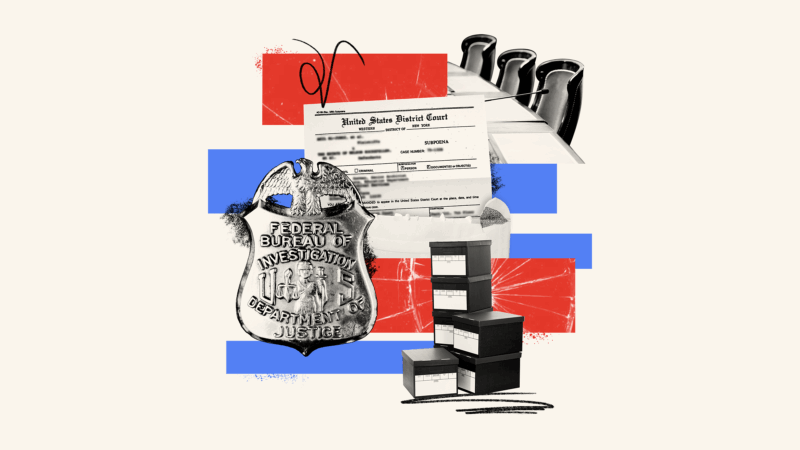How to reform domestic deployment authorities
- September 10, 2024

The brutal crackdown on nonviolent demonstrators on June 1, 2020, at Lafayette Square in Washington, D.C., and the attempted insurrection at the U.S. Capitol on January 6, 2021, provide important lessons about the need to pass reforms to how and when the National Guard may be deployed domestically, its command structure for domestic deployment, and the Guard’s legal authority when it acts. The reforms below would close loopholes in the laws that govern domestic deployment of the National Guard and help prevent politically driven misuses of Guard forces. They also would preserve the separation between the military and civilian government that is so crucial to the protection of civil liberties. Protect Democracy supports the reforms below.
Bring the National Guard’s Title 32 status in line with the Constitution
In June 2020, the Trump administration took the unprecedented position that state governors acting under Title 32 of the U.S. Code can deploy their National Guard units into other jurisdictions without those jurisdictions’ consent. This radical interpretation of the law threatens state sovereignty and raises serious constitutional concerns. It also creates a dangerous loophole in the Posse Comitatus Act — which prohibits the military from enforcing civilian laws except in situations expressly authorized by the Constitution or Congress — because it means that the president can use the military for law enforcement purposes anywhere in the country so long as they have one willing governor.
An amendment proposed in the past by Rep. Mikie Sherril (D-NJ) would require all interstate deployments of the National Guard under 32 U.S.C. § 502(f)(2)(A) to be approved by the chief executives of both the sending and the receiving state, as well as Washington, D.C. It is a tailored solution to the previous administration’s misinterpretation of statutory law, and it reaffirms the basic constitutional principle that each state maintains its own sovereignty vis-à-vis other states. Until June 2020, that was the way that Title 32 deployments had always worked.
This amendment would have no effect on the president’s ability to call the National Guard into federal service or to use Guard forces for law enforcement purposes anywhere in the country as authorized by Congress. That means the president would still be able to use the National Guard, with or without the consent of states, where necessary to enforce civil rights laws or to suppress insurrections. This Title 32 amendment has passed the House three times as part of the House versions of the FY 2021, FY 2022, and FY 2023 National Defense Authorization Acts (NDAA). However, it has not yet been enacted as part of any final NDAA.
Transfer control of the D.C. National Guard from the president to the D.C. mayor
The Posse Comitatus Act is meant to ensure that the president does not use the military as a domestic police force. It therefore applies to National Guard forces only when they are called into federal service. In D.C., however, unlike in every other state or federal territory, the National Guard is always under the command and control of the president, even when not federalized. This arrangement — a holdover from the era before D.C. had its own government — creates a major loophole in the Posse Comitatus Act. It also can prevent the timely deployment of the D.C. National Guard during a crisis, as we saw on January 6, 2021.
The D.C. National Guard Home Rule Act would solve both of these problems and bring the law up to date by transferring control over the D.C. Guard from the president to the D.C. mayor, the city’s chief elected executive. Critically, the president would retain the authority to call the D.C. Guard into federal service when doing so may be appropriate, such as to enforce civil rights laws or suppress insurrections.
The D.C. National Guard Home Rule Act has been introduced in multiple Congresses by Del. Eleanor Holmes Norton and Sen. Chris Van Hollen. The legislation passed the House in 2021 and 2022 as a part of the House versions of the National Defense Authorization Act, but has not yet been taken up by the Senate.
Prohibit privately funded deployments of the National Guard
In June 2021, South Dakota Governor Kristi Noem used a private donation from a Tennessee businessman to fund the deployment of 50 members of the South Dakota National Guard to patrol the U.S.-Mexico border in Texas. This unusual operation sets a worrying precedent. Regardless of Governor Noem’s motives, it suggests that National Guard personnel essentially are mercenaries who may be deployed on the whim of an individual willing to pay for their operations.
Members of the National Guard should not be treated as soldiers for hire. Doing so threatens to undermine public faith in the military and morale among Guard members. It also reduces transparency and hinders accountability. Congress should amend Title 32 to prohibit privately funded interstate deployments of the National Guard. Congress should take action to prohibit privately funded interstate deployments of the National Guard, except in cases of natural disaster.
An amended version of this reform, introduced by Rep. Veronica Escobar (D-TX), was enacted as part of the FY2022 NDAA but did not fix the loophole. Protect Democracy is advocating for updated language that would prohibit privately funded deployments of the National Guard.
Prevent misuse of military in domestic law enforcement
The Posse Comitatus Act prohibits the military from enforcing civilian laws except in situations expressly authorized by the Constitution or Congress. From time to time, however, the military has engaged in domestic law enforcement activity, including the collection of evidence, without the necessary authorization. That evidence, despite its collection under unlawful circumstances, nevertheless has been included in a number of legal proceedings. Stronger accountability for and robust deterrence of violations of the Posse Comitatus Act are urgently needed. The Act provides for criminal penalties, but these have never been imposed. Moreover, while suppression of evidence in court that was obtained in violation of the Posse Comitatus Act would be a meaningful enforcement mechanism, courts have been inconsistent on when and how to impose this remedy.
Rep. Adam Schiff (D-CA) first introduced an amendment to address this activity by the military in the 117th Congress. Schiff’s proposal — known also as the Strengthening the Posse Comitatus Act — would prohibit the use during legal proceedings of evidence that was collected by or with the assistance of members of the armed forces in violation of the Posse Comitatus Act. This would help to ensure accountability for violations of the law. Moreover, by making clear to military and civilian government officials that they cannot benefit in court from misusing the military on U.S. soil, in violation of the Posse Comitatus Act, this exclusionary rule would help prevent such violations in the first place.
Schiff introduced this proposal in 2020 as H.R.7297, the Strengthening the Posse Comitatus Act. The bill has passed the House twice as an amendment to the House versions of the FY2022 and FY2023 NDAA, but did not pass in the Senate NDAA.
Reform the Insurrection Act
Reforms to the Insurrection Act could include:
- Instituting congressional notification requirements and requiring congressional approval for extended deployments. Congress should be promptly notified of any invocation of the Insurrection Act and the basis for that invocation, as should any governor of a state into which troops are to be deployed. Deployments under the Insurrection Act should also be subject to a time limit unless Congress expressly authorizes an extension.
- Clarifying the conditions that allow the president to invoke the Insurrection Act. The Insurrection Act should only be available in circumstances where there is a genuine need for federal intervention, such as in the case of an actual rebellion, when states request assistance with widespread violence that they cannot contain without assistance, or in circumstances where other authorities are unable or unwilling to defend core constitutional rights.
- Removing antiquated and confusing language. The current version of the Insurrection Act refers to unlawful “combinations,” “obstructions,” and “assemblages,” and uses other outdated terms. This language should be removed or replaced as necessary to clarify the meaning of the Act.
Featured press
The Dangers of Deploying the Military on U.S. Soil Lawfare, Sep. 12, 2024 The Dangers of Deploying the Military on U.S. Soil
How the Insurrection Act (Properly Understood) Limits Domestic Deployments of the U.S. Military Lawfare, Sep. 12, 2024 How the Insurrection Act (Properly Understood) Limits Domestic Deployments of the U.S. Military
The Texas Border and Insurrection Act Reform Lawfare, Jan. 27, 2024 The Texas Border and Insurrection Act Reform
Without Congressional Action, Lafayette Square and January 6th Can Happen Again Just Security, Nov. 16, 2022 Without Congressional Action, Lafayette Square and January 6th Can Happen Again
Putting D.C. in the Chain of Command American Constitution Society, Jan. 6, 2022 Putting D.C. in the Chain of Command
D.C.’s National Guard Should Be Controlled by Its Mayor, Not by a President Like Trump Slate, Dec. 2, 2021 D.C.’s National Guard Should Be Controlled by Its Mayor, Not by a President Like Trump
The Posse Comitatus Act, Explained Brennan Center for Justice, Oct. 14, 2021 The Posse Comitatus Act, Explained
How to Stop Abusive National Guard Deployments Brennan Center for Justice, Oct. 1, 2021 How to Stop Abusive National Guard Deployments
The National Guard at Lafayette Square and the January 6th Attempted Insurrection: Fixes for the FY2022 NDAA Just Security, Aug. 31, 2021 The National Guard at Lafayette Square and the January 6th Attempted Insurrection: Fixes for the FY2022 NDAA
Three Fixes to Prevent Another Battle of Lafayette Square Defense One, June 1, 2021 Three Fixes to Prevent Another Battle of Lafayette Square
Coalition letters
Coalition Letter to House Leadership in Support of the DC National Guard Home Rule Act July 5, 2022 Coalition Letter to House Leadership in Support of the DC National Guard Home Rule Act
Coalition Letter to Congress on NDAA National Guard-Posse Comitatus Act Provisions Dec. 6, 2021 Coalition Letter to Congress on NDAA National Guard-Posse Comitatus Act Provisions
Coalition Letter to Biden on National Guard Reforms in FY22 NDAA Sept. 21, 2021 Coalition Letter to Biden on National Guard Reforms in FY22 NDAA
Coalition Letter to Congress on NDAA National Guard Amendments Sept. 3, 2021 Coalition Letter to Congress on NDAA National Guard Amendments
Coalition Letter in Support of DC National Guard Home Rule Act April 26, 2021 Coalition Letter in Support of DC National Guard Home Rule Act
Related Content
Join Us.
Building a stronger, more resilient democracy is possible, but we can’t do it alone. Become part of the fight today.
Donate
Sign Up for Updates Sign Up for Updates
Explore Careers Explore Careers
How to Protect Democracy How to Protect Democracy

